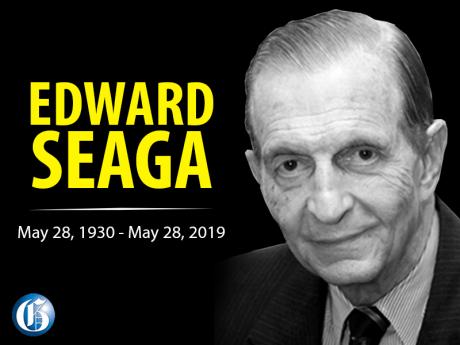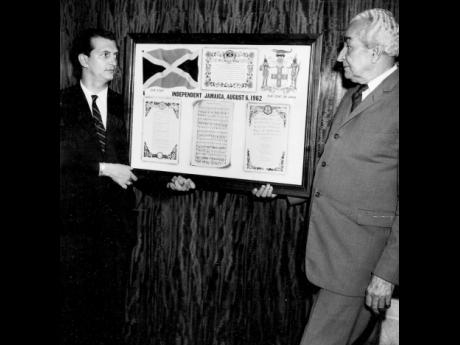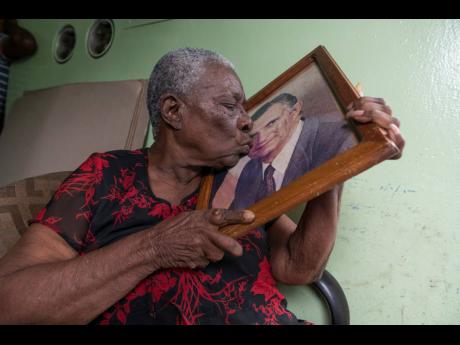Bell tolls for Eddie - ‘Thanks for everything,’ icon told nation
Lauded as a political colossus who helped build the foundations of nationhood and feared as a mercurial leader who suppressed party rebels, Edward Philip George Seaga lost his final battle yesterday, dying on the date, and in the land, of his birth.
He was 89.
Jamaica’s fifth prime minister, who had cancer, passed away at a Miami, Florida, hospital in the United States of America.
News of Seaga’s death plunged much of the nation into mourning, especially high-ranking members of the ruling Jamaica Labour Party (JLP) and his beloved political stronghold, Tivoli Gardens, many too overwhelmed with grief to speak.
Prime Minister Andrew Holness announced Seaga’s death on Twitter yesterday, telling the country that his political father had died sometime after 1 p.m.
That announcement signalled the end of an era as Seaga was the last of Jamaica’s larger-than-life pre-Independence politicians, having been appointed to the then Legislative Council in 1959.
His death was greeted with tributes from across the political spectrum.
In Parliament, Holness said even though he and the Seaga family were prepared for his passing, the reality of his death hit hard.
The prime minister informed the Lower House that Seaga’s remains will be flown back to Jamaica shortly. He will be honoured with a state funeral.
“It is a personally trying time for me and I know it is a very trying time for his family, and though they were prepared and I was prepared at the point of the event, you still can’t help but feel the emotional void that has been created by his passing,” Holness said to a gloomy Parliament, his voice cracking.
“I went to visit with in a few days ago before his passing and though he was not in a position to speak for any long period, by virtue of his expressions, how he held my hands and just looking in his eyes, he was satisfied that his legacy would be protected and enhanced, that his work and contribution to the development of this country would be respected,” Holness stated.
“All Jamaica should know that when I was about to leave the hospital room, I held his hands and he squeezed my hands and said, ‘Thank you, Andrew, tell the Jamaican people thanks for everything’.”
Seaga’s nephew, businessman Metry Seaga, paid tribute to the late prime minister, noting he was a family man.
“I honour the service that you gave to your country. My heart wept when I saw in later years your sadness at the lost time with your older kids. Only those close to you will truly know what you gave up so that you could give to your country and its people,” he said on Facebook.
Seaga, a towering figure in Jamaica’s political landscape and one of the most controversial and feared leaders, is one of the longest-serving members of parliament in the Caribbean, spending a total of 43 years as a legislator.
Approval from Reagan, Thatcher
Seaga’s election as prime minister in 1980 marked a critical moment in the island’s history, one that broke the left-leaning consensus of its post-Independence politics and set the country on a more conservative path that gained the approval of allies such as Ronald Reagan and Margaret Thatcher.
As soon as he became prime minister, he pursued a domestic agenda of privatisation and deregulation, while in foreign policy he realigned Jamaica firmly with the West.
Within that period, he had become both admired and detested for his pro-market domestic reforms.
His detractors had complained that his policies had resulted in the widening of the gap between the rich and the poor. But by the time Seaga had lost political power to a roaring Michael Manley-led regime in 1989, the political and economic landscape had shifted so dramatically that even the PNP was unwilling to return to the extreme leftist ground it had once occupied.
Under Seaga, the JLP lost badly in the 1993 and 1997 elections, then marginally in 2002, by which time his leadership became toxic and suicidal to the Labour Party’s electability.
The last of Jamaica’s founding political fathers, Seaga was never to become prime minister again, stepping down in 2005 as leader of the JLP and opposition leader to make way for Bruce Golding.
Still, he took some solace in the fact that his nine years in Government had forced Manley and then his PNP successors to adopt a more moderate approach both in Opposition and in office.
In retirement, Seaga wrote two extensive volumes of political memoirs and was a research fellow at the University of West Indies. He also became chancellor of the University of Technology.
Twice married, in 1965 to Mitsy (Marie) Constantine, a former television presenter and Miss Jamaica, and then to Carla Vendryes, a sociology researcher, in 1996, Seaga is also survived by Carla, by his children, Gabrielle, Christopher, Andrew and Anabella.
SEE EXTENSIVE COVERAGE OF EDWARD SEAGA'S LIFE AND LEGACY IN TODAY'S PRINT EDITION OF THE GLEANER



